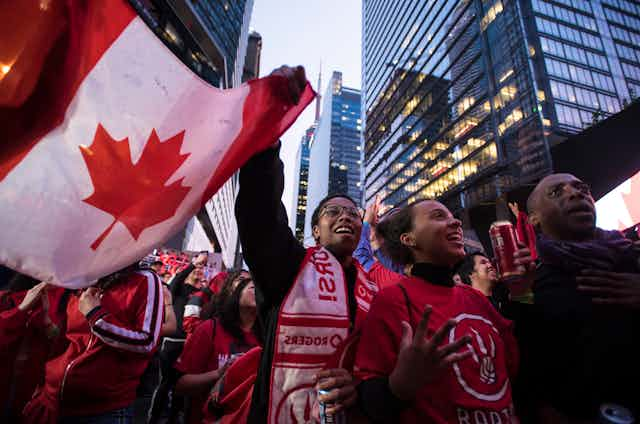As we approach Canada Day — and the prospect of the return of “freedom” protests in Ottawa — let’s consider the meaning and symbolism of the Canadian flag.
After weeks of the so-called freedom convoy last winter, many of us took a hard look at the symbolism of the Canadian flag and its recent association with white supremacy. Some, like me, felt a new fear or anger at what they feel the flag represents.
But other communities have always felt this way about the Canadian flag.
After unmarked graves were found at the sites of former residential schools, the Canadian flag was flown at half-mast in many places to show shame for our collective history and solidarity with Indigenous communities. And last year on Canada Day, many called for people to wear orange instead of red and white.
Other movements like Landback, Resistance150, Idle No More, Pride and Black Lives Matter have also raised awareness about challenges to Canadian nationalism and belonging.
Both of our guests on this episode of Don’t Call Me Resilient have studied multiculturalism, citizenship and belonging. Daniel McNeil looks at history and culture and the complexities of global Black communities. He is a professor and Queen’s National Scholar Chair in Black Studies at Queen’s University. Lucy El-Sherif is a PhD candidate at the University of Toronto in ethnic and pluralism studies.

Symbols can and do change
In our conversation, Daniel McNeil said:
The flag can be many different things. But I think the critical question is to ask, why are those who acknowledge its violence depicted as killjoys or marginalized or stigmatized?“
Lucy El-Sherif said:
"We really need to think about what does it mean to be a person of colour living as a settler on Indigenous lands. And what does it mean for us to express solidarity with Indigenous people? The stakes for people of colour are very different.… Whenever we question what’s going on with Canada, [we get]: ‘Go back to where you came from. You should be grateful that you came to this country.’”
For a lot of people, the Canadian flag is a symbol to be proud of: it’s something they feel represents Canada’s multiculturalism, the idea that the country can welcome anyone. They want to fly the flag — whether at a Raptors game, World Cup match or rally.
Some writers of op-eds have pleaded audiences to fly the flag this year, to take back a symbol they feel proud of.
As McNeil said, Canada is defined as:
“welcoming to others … with positive traits of fairness, openness and generosity … we have these feelings that we’re associating with a flag, but [we should also take] seriously how others may associate that flag with pleasure or with joy. And how do we open up space for those conversations about different historical memories?”

Articles from The Conversation
- The Canadian flag and the ‘freedom convoy’: The co-opting of Canadian symbols by Heather Nicol
- Canada needs a new citizenship oath: OISE expert by Lucy El-Sherif
- ‘O Canada’: Why I no longer stand for the national anthem by Jason Laurendeau
- This Canada Day, settler Canadians should think about land back by Kaitie Jourdeuil
- Raptors victory: Feel-good multiculturalism masks reality of anti-Black racism in Canada by Corrie Scott
- Black Canadian activists pressured to be ‘quiet’ leaders by Daniel McNeil
Resources
- “Why did Masuma Khan’s post invite censure from Dalhousie if free speech is so vaunted?” by Shree Paradkar
- “Webs of Relationships: Pedagogies of Citizenship and Modalities of Settlement for ‘Muslims’ in Canada” by Lucy El-Sherif
- “‘Multicultural Snake Oil’ & Black Cultural Criticism” by Daniel McNeil and Chris Russill
- “Let America Be America Again” by Langston Hughes
- Unsettling the Great White North: Black Canadian History, edited by Michele A. Johnson and Funké Aladejebi
- In Search of the Black Fantastic: Politics and Popular Culture in the Post-Civil Rights Era by Richard Iton
- ’There Ain’t no Black in the Union Jack:’ The Cultural Politics of Race and Nation by Paul Gilroy
- Red Skin, White Masks: Rejecting the Colonial Politics of Recognition by Glen Sean Coulthard
- Dear Science and Other Stories by Katherine McKittrick
- Bad Faith and Antiblack Racism by Lewis R. Gordon
Follow and listen
You can listen to or follow Don’t Call Me Resilient on Apple Podcasts, Google Podcasts, Spotify or wherever you listen to your favourite podcasts. We’d love to hear from you, including any ideas for future episodes. Join The Conversation on Twitter, Facebook, Instagram and TikTok and use #DontCallMeResilient.
Don’t Call Me Resilient is produced and hosted by Vinita Srivastava. Series co-producers are: Lygia Navarro and Haley Lewis. Vaishnavi Dandekar is an assistant producer. Jennifer Moroz is our consulting producer. Lisa Varano is our audience development editor and Scott White is the CEO of The Conversation Canada. Don’t Call Me Resilient is a production of The Conversation Canada and was produced with a grant for Journalism Innovation from the Social Sciences and Humanities Research Council of Canada.
Transcript
For an unedited transcript, go here.
Sound Credits
Thank you to the following sources for additional sound:

